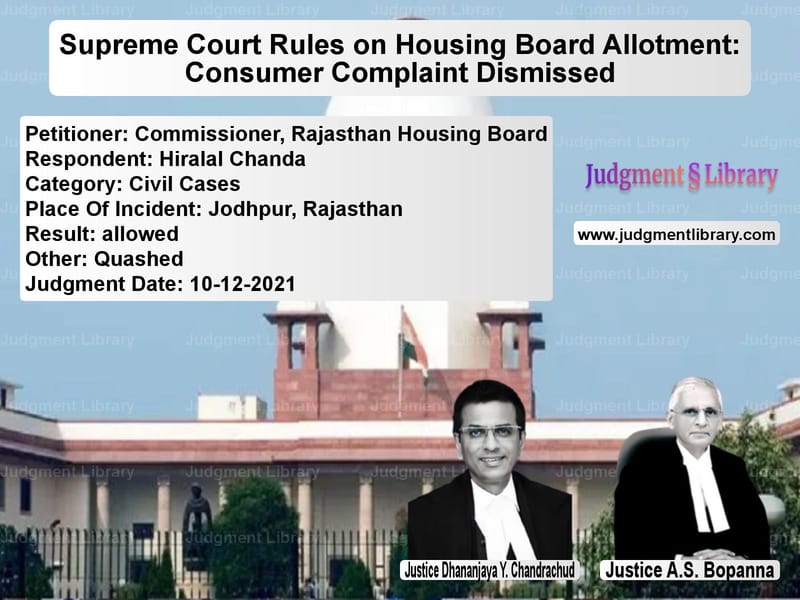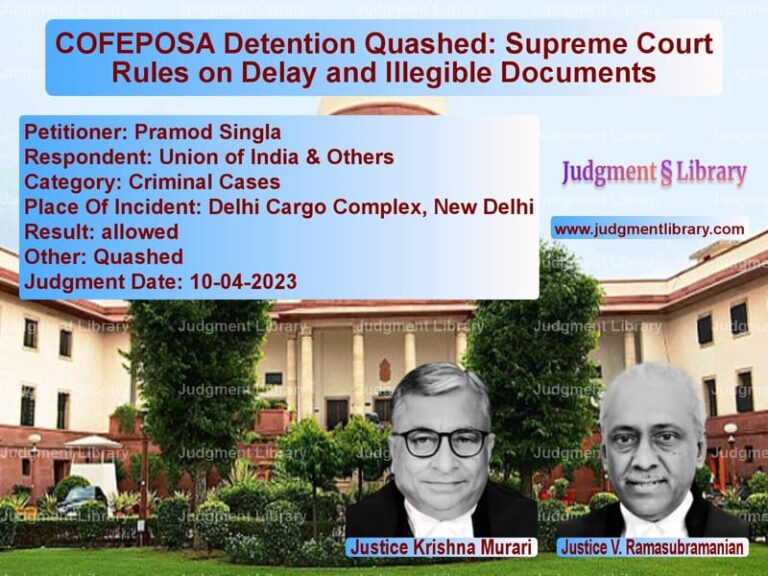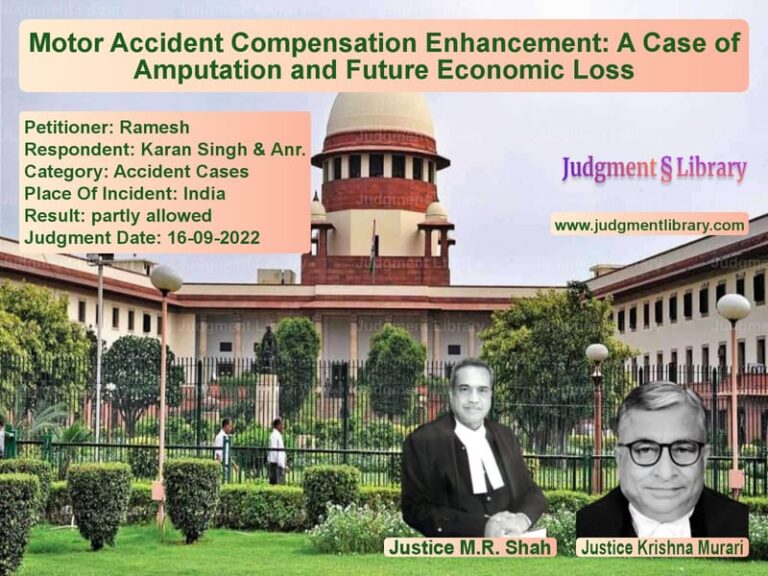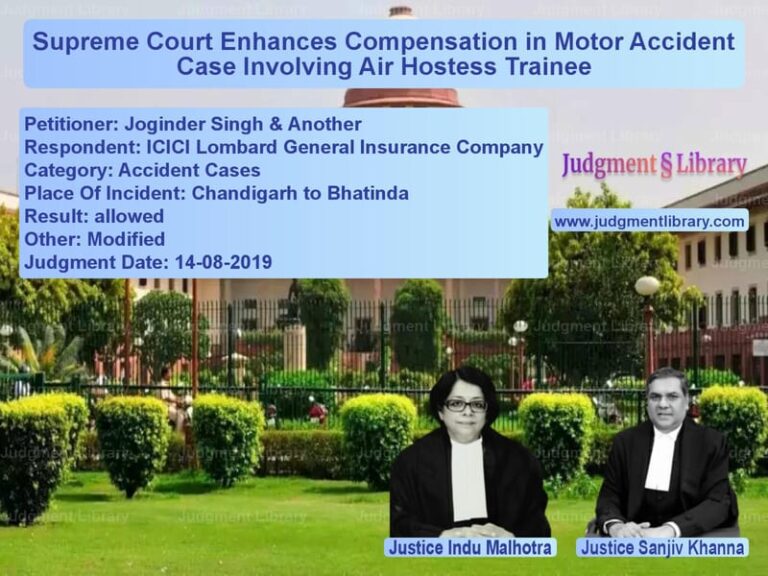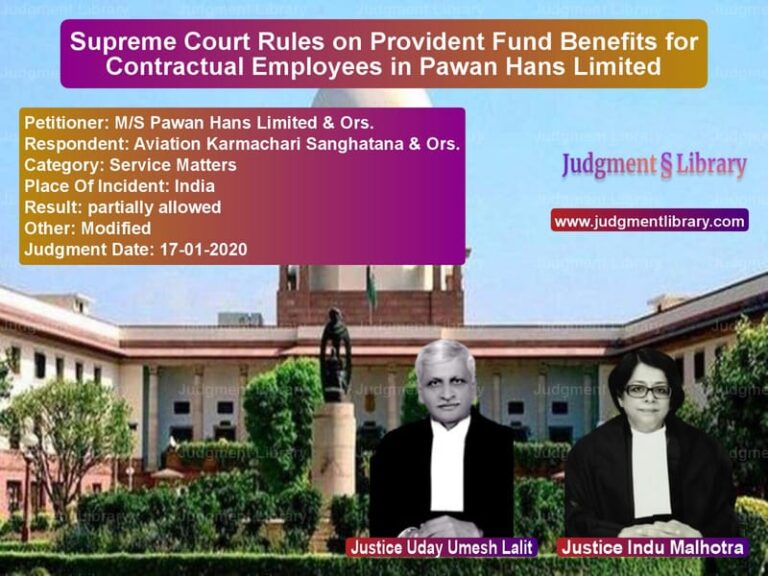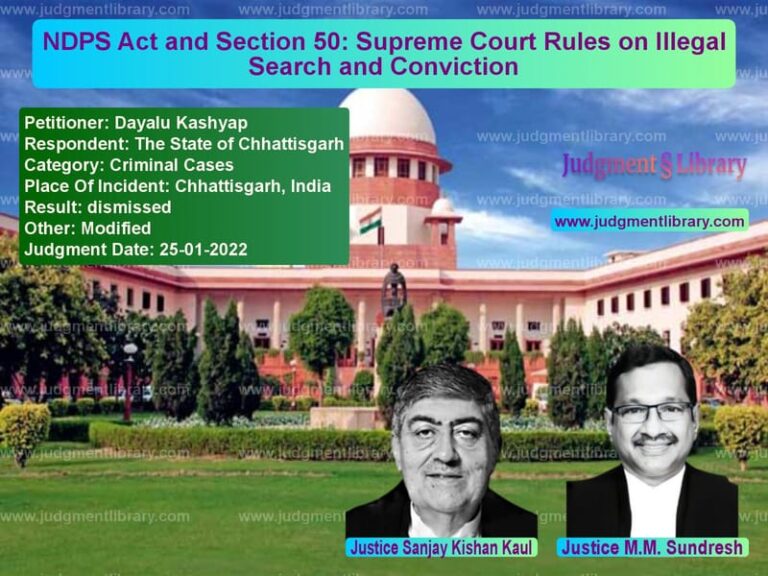Supreme Court Rules on Housing Board Allotment: Consumer Complaint Dismissed
The Supreme Court of India recently ruled in favor of the Commissioner, Rajasthan Housing Board, dismissing a consumer complaint filed by Hiralal Chanda. The dispute arose from the cancellation of Chanda’s housing registration under a General Registration Scheme initiated in 1985. The case involved key issues related to procedural fairness in government housing schemes, delay in seeking legal remedies, and the applicability of consumer protection laws. The Supreme Court overturned the rulings of the National Consumer Disputes Redressal Commission (NCDRC) and the State Consumer Disputes Redressal Commission (SCDRC), concluding that the respondent failed to fulfill his obligations under the scheme.
Background of the Case
The Rajasthan Housing Board launched a General Registration Scheme in 1985 for the allotment of Middle Income Group (MIG-B) houses in Jodhpur under a hire-purchase mode. Hiralal Chanda submitted an application on February 23, 1985, along with a registration fee of Rs. 5,000. The Housing Board confirmed his registration on May 31, 1985.
According to the Housing Board, a reservation-cum-demand letter was sent to Chanda on September 3, 1993, instructing him to deposit the required seed money in three installments. However, Chanda denied receiving the letter, arguing that it was sent to an old address. The Housing Board later issued another communication on April 15, 1999, reiterating the demand for seed money. Chanda responded on May 3, 1999, seeking an extension of one and a half months to make the deposit but failed to do so.
Due to non-payment, the Housing Board canceled Chanda’s registration on May 29, 2000, offering him a refund of the Rs. 5,000 registration fee. Chanda acknowledged receiving the cancellation notice but did not challenge it immediately.
Legal Dispute and Consumer Complaint
In 2009, the Housing Board introduced a policy to restore canceled allotments if the cancellation resulted from an administrative error. However, the policy explicitly stated that cases where the cancellation was due to the applicant’s default would not be restored.
Chanda applied for restoration on August 2, 2010, which the Housing Board rejected. Following this, he filed a consumer complaint before the District Consumer Disputes Redressal Forum, Jaipur, in 2011, alleging a deficiency in service and wrongful cancellation of his registration.
The District Forum ruled in his favor, directing the Housing Board to restore his registration and allot him a house at the rate applicable when the next junior applicant received an allotment. The ruling was upheld by the State Consumer Disputes Redressal Commission (SCDRC) in 2016 and later by the National Consumer Disputes Redressal Commission (NCDRC) in 2018.
Arguments Before the Supreme Court
Appellant’s (Housing Board) Arguments:
- Chanda failed to deposit the seed money despite multiple notices, leading to the lawful cancellation of his registration.
- The District Forum wrongly assumed that the Housing Board was at fault without considering Chanda’s failure to comply with the payment conditions.
- His consumer complaint was time-barred under Section 24A of the Consumer Protection Act, 1986, which sets a two-year limitation period from the date of the cause of action.
- Chanda did not take any action to challenge the cancellation for nearly a decade (2000-2011).
Respondent’s (Chanda’s) Arguments:
- He did not receive the initial demand letter of 1993, and the Housing Board failed to provide proof of its delivery.
- The Housing Board’s 2009 policy should have applied to his case, allowing for restoration.
- His financial constraints prevented him from making timely payments, and the Board should have considered his difficulties.
Supreme Court’s Observations
The Supreme Court considered the legal validity of the cancellation and the applicability of consumer protection laws. The key observations were:
- Failure to Deposit Seed Money: The Court held that Chanda failed to fulfill his financial obligations under the scheme, and his registration was rightfully canceled.
- Statute of Limitations: The Court emphasized that Section 24A of the Consumer Protection Act mandates that consumer complaints be filed within two years of the cause of action. Since Chanda waited over 11 years, his complaint was time-barred.
- Housing Board’s Policy Not Applicable: The Court noted that the 2009 policy applied only to cases where cancellations resulted from administrative errors. Since Chanda’s case involved non-payment, it did not fall within the policy’s scope.
- No Deficiency in Service: The Court ruled that the Housing Board acted per the scheme’s terms, and there was no deficiency in service that justified a consumer complaint.
Final Judgment
The Supreme Court ruled as follows:
- The appeals were allowed, and the orders of the NCDRC, SCDRC, and District Forum were set aside.
- Chanda’s consumer complaint was dismissed as time-barred and lacking merit.
- The Housing Board, however, offered to provide Chanda with an alternate allotment at current rates. If he refused, his registration fee would be refunded.
Key Takeaways
- Consumer Complaints Must Be Filed Within the Limitation Period: The ruling highlights the importance of adhering to statutory timelines under the Consumer Protection Act.
- Failure to Meet Financial Obligations Can Lead to Legitimate Cancellation: Buyers must fulfill payment requirements in housing schemes to retain their rights.
- Administrative Policies Have Defined Scope: Beneficiaries of government schemes cannot claim relief under policies that do not apply to their specific circumstances.
- Judicial Scrutiny of Consumer Disputes: Courts will intervene when consumer forums exceed their jurisdiction by granting reliefs inconsistent with contractual obligations.
This judgment reinforces the legal principle that public housing schemes must be implemented fairly while ensuring that beneficiaries fulfill their obligations.
Petitioner Name: Commissioner, Rajasthan Housing Board.Respondent Name: Hiralal Chanda.Judgment By: Justice Dhananjaya Y. Chandrachud, Justice A.S. Bopanna.Place Of Incident: Jodhpur, Rajasthan.Judgment Date: 10-12-2021.
Don’t miss out on the full details! Download the complete judgment in PDF format below and gain valuable insights instantly!
Download Judgment: commissioner,-rajast-vs-hiralal-chanda-supreme-court-of-india-judgment-dated-10-12-2021.pdf
Directly Download Judgment: Directly download this Judgment
See all petitions in Property Disputes
See all petitions in Consumer Rights
See all petitions in Judgment by Dhananjaya Y Chandrachud
See all petitions in Judgment by A. S. Bopanna
See all petitions in allowed
See all petitions in Quashed
See all petitions in supreme court of India judgments December 2021
See all petitions in 2021 judgments
See all posts in Civil Cases Category
See all allowed petitions in Civil Cases Category
See all Dismissed petitions in Civil Cases Category
See all partially allowed petitions in Civil Cases Category

